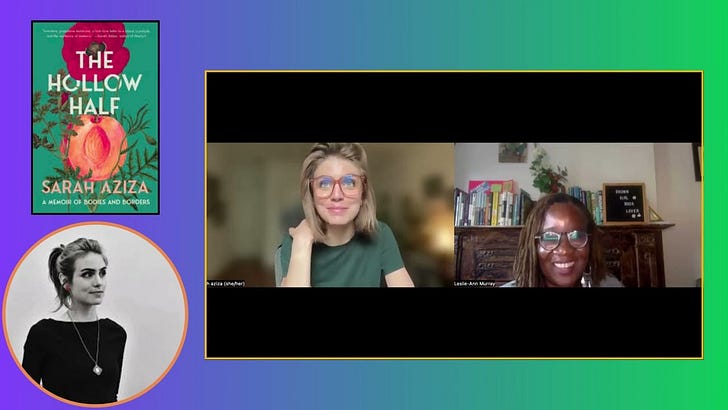The Things We Inherit: My Mother, Her Ghosts, & The Book That Made Me Pause
Your Wednesday Read
What To Read This Week? The Hollow Half by Sarah Aziza!
While reading The Hollow Half by Sarah Aziza, I kept thinking of my mother, of the stories she told and the ones she refused to name. Aziza writes with a precision that leaves room for silence, for ghosts, for the ache of unspoken histories. Her work is about exile, survival, and the hollow spaces we carry inside us. It reminded me of how my mother chose a dress instead of her first paycheck, and how she blamed herself for that choice for the rest of her life. That moment, like so many in Aziza’s book, reveals how girlhood is often shaped by impossible decisions — and how women are asked to live with those decisions quietly.
Where the Silence Lives: Reading The Hollow Half Through My Mother’s Story
“You can have all the book sense in the world, but if you don’t have common sense, nothing good will happen in your life,” my mother always used to tell me. She did not trust bookish people - they had all the right words to make meaning, and the keys to open every door, but they allowed the world to surpass them because they got stuck in the language, in the critical thinking, in making the right choice with their mind, instead of their body.
At the same time, she demanded that my siblings and I attend college or get a trade, so we could quickly access the materialities - a house, car, and savings - that came with this level of education. But she warned us to hold on to our common sense. It grounded us in reality and also connected us to our mother. Growing up, I hated her common-sense mantra. It was too ordinary, too limiting, and I enjoyed daydreaming.
Two major incidents happened in my mother’s life that squeezed her into this singular motto: the first one happened when she was thirteen years old, and her father stole her out of the house, and forced her to be a maid for an affluent Syrian family in the capital. She worked for them for one week, and when it was pay day, her employer offered her two options: a very pretty dress or her salary.
My mother wanted to feel like her employer - rich, pretty, and confident, so she chose the dress. “I was so dumb,” my mother said. “I should have taken the money.” My mother did not blame her rich employer, who exploited her naivety. She did not blame her father, who used her as an indentured servant. She was thirteen years old without agency, yet she blamed her lack of common sense. At seventy-two, my mother has many dresses, many shoes, my purses that have filled every closet in her house, but that exploit, that betrayal, still lives in her body.
The second incident happened fifty years ago. It was Christmas morning, and my grandfather came home drunk. They were not surprised by his drunken state, by they were surprised by his lie. He told them that he had been robbed and the thief had stolen his monthly salary. They all knew that had lost his money to a card game, or a domino game, or a cock fighting game. His vices had stolen their Easters and birthdays.
My mother and her siblings stayed inside their apartment, quiet as a church mouse, pretending they were not home, while they listened to their neighbors celebrate. In the back room, my grandfather slept off his rum haze, and my grandmother locked herself in the closet until Christmas was over.
“I will never forgive them,” my mother says whenever she recalls this story. “They did not have any shame.”
“She was depressed,” I would say. “Her mother died at an early age, and she’d spent her youth with your horrible father.”
“She was damn lazy, without any common sense,” my mother would retort.
This incident did not persuade my grandmother to find a job and stop depending on my unreliable grandfather. But it convinced my mother that another version of life without shame and hunger was possible. A few weeks later, my mother stopped attending primary school and started working at a warehouse. Her parents did not protest her actions. They were just one generation out of slavery; they only owned their bodies, but their memories and souls were still in bondage. The ghosts of the past followed them, weighted them down, and made their existence nearly impossible. The extra income from their offspring meant they would not have to work too hard, my grandfather could gamble without feeling guilty, and my grandmother could spend her days in a hazy, depressive sleep.
My mother did not know how to read when she left school. She lived in a time when common sense was the mainstay and reading was for folks who had privilege, and who could afford to dream. She developed many tactics to navigate a world of letters, and she hid her shame in her opulent material items.




Powerful. ❤️